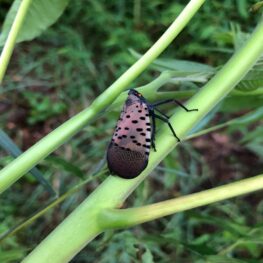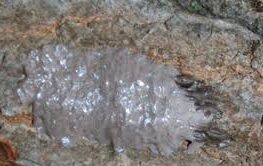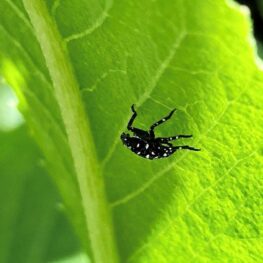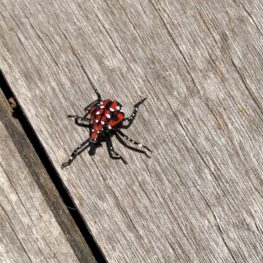
Adult lanternfly (July – Dec)
Residents here in the Upper Raritan River watershed are at the battlefront for stopping the spread of the spotted lanternfly – a species native to Asia. Raritan Headwaters is a nonprofit environmental organization with a mission of protecting water resources in the Upper Raritan. Our forests are key to maintaining good water quality, and the spotted lanternfly puts native forests and water resources at risk.
The spotted lanternfly (Lycorma delicatula) is not a species of “fly” at all; it is actually a planthopper that feeds on the sap of trees and grapevines, often resulting in great damage. The spotted lanternfly was first introduced to Berks County, PA, from Asia in 2014 and has since been rapidly spreading.

Egg mass (Sept – June)
Like most invasive exotic species, they have certain key ecological traits: they have few natural predators in their new home; they are very prolific and reproduce quickly; and they are flexible in their ecological requirements such as food, habitat, and temperature tolerances. Many species invasive to New Jersey come from Europe and cooler regions of Asia because the climate in those places is like ours.

1st to 3rd Instars (May – July)
Once established, the spotted lanternfly can wreak havoc on our native species, which have never had the chance to meet them and evolve to compete or defend themselves against these newly introduced species. Our regions’ forest ecosystems and agricultural economy are at great risk from spotted lanternfly and other invasive plants and animals and, in fact, invasive species cost our economy billions of dollars each year. The spotted lanternfly attacks fruit trees (think orchards), grapevines (think vineyards), and our native hardwood and pine trees (the list is at 70+ species and it keeps growing). Its preferred food is another prolific invasive – the tree-of-heaven or Ailanthus (Ailanthus altissima). We are still learning about the impacts and control of this new insect in our region but we do know we need to take measures now to stop its spread.

4th Instar (July – Sept)
In the Upper Raritan watershed, Somerset and Hunterdon counties are considered under quarantine for spotted lanternfly and there is no need to report sightings. Morris County is still on the invasion front. If you live in Morris County, report new sightings to the State of New Jersey Department of Agriculture at the Department by emailing slf-plantindustry@ag.nj.gov or by calling 609-406-6943.
Here is what YOU can do to help stop the spread of spotted lanternfly:
- Learn how to identify spotted lanternfly in its various life stages and how to distinguish its preferred host, tree-of-heaven or Ailanthus, from beneficial native species such as sumacs and black walnut.
- Kill the spotted lanternfly when you find it. If it is just a few individuals that is easy but when you have an invasion you will need to trap and treat them. None of us enjoy killing things, but this species will result in higher mortality among our native tree species if left unchecked.
- Control their favorite food, tree-of-heaven or Ailanthus, using techniques available here. Just cutting them down will not work because they will sprout many more individual trees from their roots, so be sure to follow this link. Leave a couple of “trap trees” to attract the majority of spotted lanternfly on your property, then trap and treat them. Homemade circle traps installed on the trunk of affected trees is one way to efficiently trap and kill spotted lanternfly.
- Find their egg cases in fall-winter, scrape them off and destroy them. Spotted lanternflies overwinter in the egg stage, so this will have a huge impact. Egg cases are grayish-brown and can resemble splotches of mud. They may be found in a variety of locations including tree trunks, cement, wood, and metal surfaces. Learn more about what they look like and how to remove them so there will not be a hatch of baby spotted lanternfly next spring.
- Your car and other vehicles can spread the lanternfly. During spring, summer and early fall, do not park your car under trees to avoid “hitchhikers” and adults depositing eggs. If you must park there, check your vehicle before departing for an area outside the quarantine zone.
- Plant native species around your home. That includes trees, shrubs, and herbaceous plants. Avoid non-native, exotics. Learn more about native plants and where you may purchase them here.
For additional resources on identifying, reporting, and controlling spotted lanternfly and tree-of-heaven visit the NJ Department of Agriculture Spotted Lanternfly Program.
